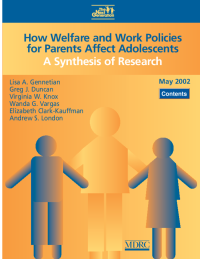How Welfare and Work Policies for Parents Affect Adolescents
A Synthesis of Research
The federal law that overhauled the nation's welfare system in 1996 aimed to break the cycle of poverty through its effects not only on welfare recipients but also on their children. While it was feared that some of the policy changes might harm young children, it was generally believed that older children would benefit from new community norms and the presence of working parents as role models. But analyses from several MDRC studies released in recent years suggest that the new policies did not bring benefits to adolescents. With reauthorization of the 1996 law now under debate, the Next Generation project — an innovative collaboration among MDRC and other leading research institutions — has produced this research synthesis, the first comprehensive and systematic look at how welfare and work policies targeted at low-income parents have influenced their adolescent children. Using meta-analytic techniques, the work integrates survey data collected from parents in eight MDRC studies of 16 different welfare and employment programs, focusing on children aged 12 to 18 when the surveys were conducted; it also draws on ethnographic case studies to flesh out the quantitative findings.
In each study, some parents were randomly assigned to a program that included some combination of three key policies — mandatory employment activities, earnings supplements, and time limits on welfare receipt — while others were randomly assigned to a control group that was neither eligible for the program's services nor subject to its requirements. Random assignment ensures that any differences that emerged between the two groups — or their children - are attributable to the program. Although the studies examined programs that began operating before 1996, the three policies examined here have been adopted, in various combinations, in many states' programs since welfare reform was passed. Thus, this is the best body of evidence to date concerning how low-income adolescents fare as a result of policies aimed at increasing their parents' employment.
Key Findings
- When asked about their adolescent children, parents in the programs under study reported worse school performance, a higher rate of grade repetition, and more use of special educational services than did control group parents. On average, the programs did not, however, affect the proportion of adolescents who dropped out of, were suspended from, or completed school. There were likewise no overall differences between the program and control groups in the proportion of adolescents who had children. Girls and boys fared similarly on all the outcomes examined.
- No single one of the three policies under study could explain the programs' effects on adolescents. For instance, negative effects were observed both for the programs that required parents to work or to participate in work activities in order to receive welfare benefits and for the programs in which parents' work participation was purely voluntary.
- Adolescents with younger siblings experienced the most troubling effects. As well as showing larger unfavorable effects on school performance and receipt of special educational services than did the full sample, program group adolescents with younger siblings were more likely than their control group counterparts to be suspended or expelled from and to drop out of school - perhaps because they were also more likely to provide care for their siblings. Program group adolescents without younger siblings, in contrast, were more likely than their control group counterparts to participate in out-of-school activities and experienced few effects on school outcomes.
Together, the findings point to the challenges faced by low-income single parents who work - most of whom hold inflexible, unpredictable low-wage jobs - as well as the unmet child care needs associated with their employment. Possible strategies for mitigating the negative effects of welfare reform on adolescent children include reducing the need for them to assume adult responsibilities at home, ensuring that they have access to high-quality supervised activities outside school, and finding ways to resolve the conflicts that their low-income parents face in juggling parenthood and inflexible employment.






